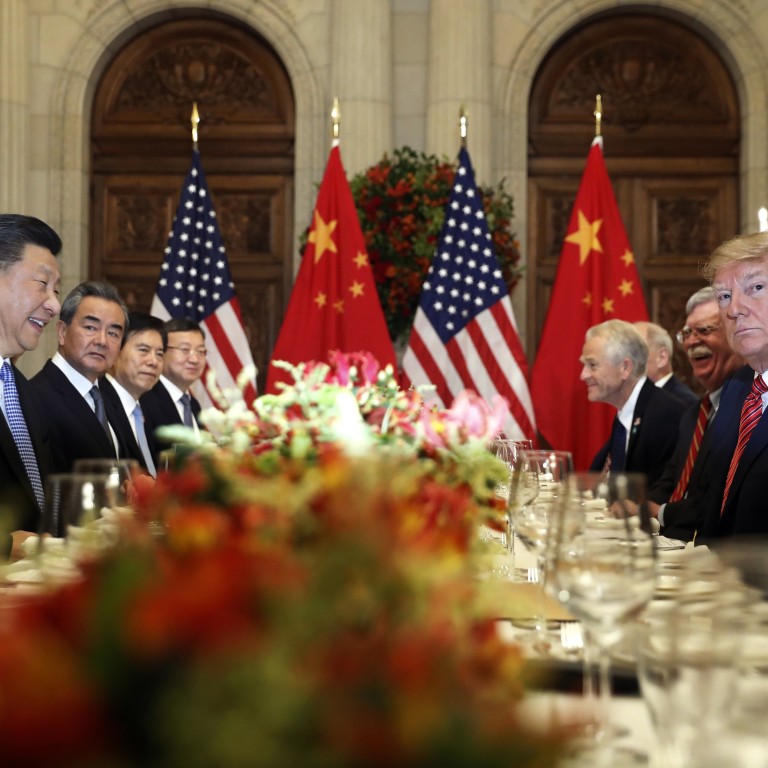
China confirms ‘proactive and constructive’ US trade talks in Beijing next week
- Deputy trade representative Jeffrey Gerrish will lead the vice-ministerial level American delegation for ‘proactive and constructive talks’ on January 7-8
China on Friday confirmed that a vice-ministerial level delegation from the United States will visit Beijing next week for “proactive and constructive talks” to flesh out trade agreements reached between President Xi Jinping and US counterpart Donald Trump in Argentina last month.
The talks on January 7-8 will be the first face-to-face meeting between the two the countries over trade since Xi and Trump agreed a 90-day truce in Buenos Aires on December 1.
Deputy US trade representative Jeffrey Gerrish will lead the American delegation, China’s Ministry of Commerce said, without revealing the leader of the Chinese delegation.
The US delegation “will conduct proactive and constructive talks with the Chinese working group over how to implement important consensus reached by the two state leaders in Argentina”, the commerce ministry said in a statement.
The visit was only finalised after a “vice-ministerial level” phone call on Friday morning, highlighting Beijing’s eagerness to confirm the meeting, with the Office of the United States Trade Representative (USTR) yet to confirm the visit.
China's benchmark stock indices in Shanghai and Shenzhen gained over 1 per cent on Friday morning after confirmation of the trade talks, erasing early morning losses.
“Both sides have the intention to solve the trade problems,” Lian Ping, the chief economist for the Bank of Communications, the fifth largest Chinese lender, said.
“For China, less protectionism [from the US side] will help to reduce its economic pressure at home.”
Bloomberg reported that the talks will be divided into groups dealing with non-tariff measures, intellectual property, agriculture and industrial purchases.
It added that other American officials at the talks will include Gregg Doud, the USTR’s chief agricultural negotiator; David Malpass, the Treasury Department’s under secretary for international affairs; Gil Kaplan, under secretary of commerce for international trade; Ted McKinney, under secretary of agriculture for trade and foreign agricultural affairs; and Merry Lin, director for global and Asia economics at the National Security Council.
US trade representative Robert Lighthizer, who is in overall charge of trade talks with China, is expected to meet with Chinese vice-premier Liu He, Xi’s top economic adviser, later this month.
Xu Jianwei, senior China economist from Natixis in Hong Kong, said it is almost certain that Beijing and Washington will find common ground this time to avoid an escalation of the trade war.
“The Chinese side will make significant concessions, and the US side is in need of some good results as well,” Xu said.
“The US economy didn’t perform well in the last month, and people may start to blame Trump’s economic policies – he is in need of something to calm the anxieties.”
Xi and Trump talked over the phone last week, with the American president tweeting that a “deal is moving along very well. If made, it will be very comprehensive, covering all subjects, areas and points of dispute. Big progress being made!”
However, questions remain over whether the two countries can defuse the trade war before the deadline of March 2.
US trade representative Lighthizer is deeply sceptical of Beijing and has warned Trump that the US may need to exert more pressure through “additional tariffs” to win true concessions, The New York Times reported.
Shortly before China’s confirmation of the trade talks, Trump said in a tweet: “The United States Treasury has taken in MANY billions of dollars from the Tariffs we are charging China and other countries that have not treated us fairly. In the meantime we are doing well in various Trade Negotiations currently going on. At some point this had to be done!”
Jon Cowley, senior international trade lawyer at Baker McKenzie in Hong Kong, said that expectations of a deal being reached next week should be managed, but that companies are already feeling the pain of the initial raft of tariffs.
An extension of a ceasefire would not ease this pain, since the initial tariffs would remain in place, and with the Trump administration in intransigent mood with regard domestic issues, including the government shutdown and funding for the border wall with Mexico, it may be reluctant to show any sign of weakness towards China.
“I have sober expectations,” Cowley said. “This is a chess match and they’re not necessarily publicising their thinking. We’re all keen to monitor each and every move sequentially to see what the next move might be.”
“Under a ceasefire the parties don’t necessarily concede any territory already taken. If that’s what we’re looking at, then it’s possible the existing tariffs remain intact. Those are hurting companies,” Cowley added.
Additional reporting by Sidney Leng and Bloomberg



